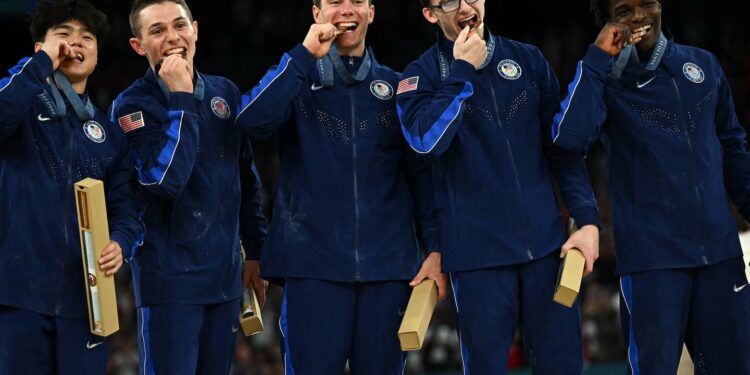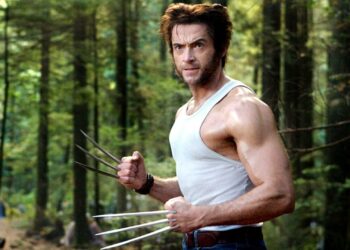pinned
Men’s team final results
Japan, 259.594 🏅China, 259.062 🥈USA, 257.793 🥉Great Britain, 255.527Ukraine, 254.761Italy, 248.260Switzerland, 247.427Canada, 245.426
US scores from team final
Rotation 1, still rings: Frederick Richard (14.022), Brody Malone (14.033), Asher Hong (14.533)
Rotation 2, vault: Paul Juda (14.666), Brody Malone (14.533), Asher Hong (14.833)
Rotation 3, parallel bars: Brody Malone (14.433), Frederick Richard (14.566), Asher Hong (14.400)
Rotation 4, horizontal bar: Paul Juda (13.366), Frederick Richard (14.822), Brody Malone (14.16)
Rotation 5, floor: Paul Juda (14.200), Asher Hong (14.133), Frederick Richard (14.466)
Rotation 6, pommel horse: Paul Juda (13.900), Brody Malone (13.700), Stephen Nedoroscik (14.866)
Get Globe Weather Forecast
Your essential daily forecast, delivered daily at 6:30 am.
US men get their medals — 2:50 p.m.
See photos from the ceremony:
Team USA poses with their bronze medals.PAUL ELLIS/AFP via Getty Images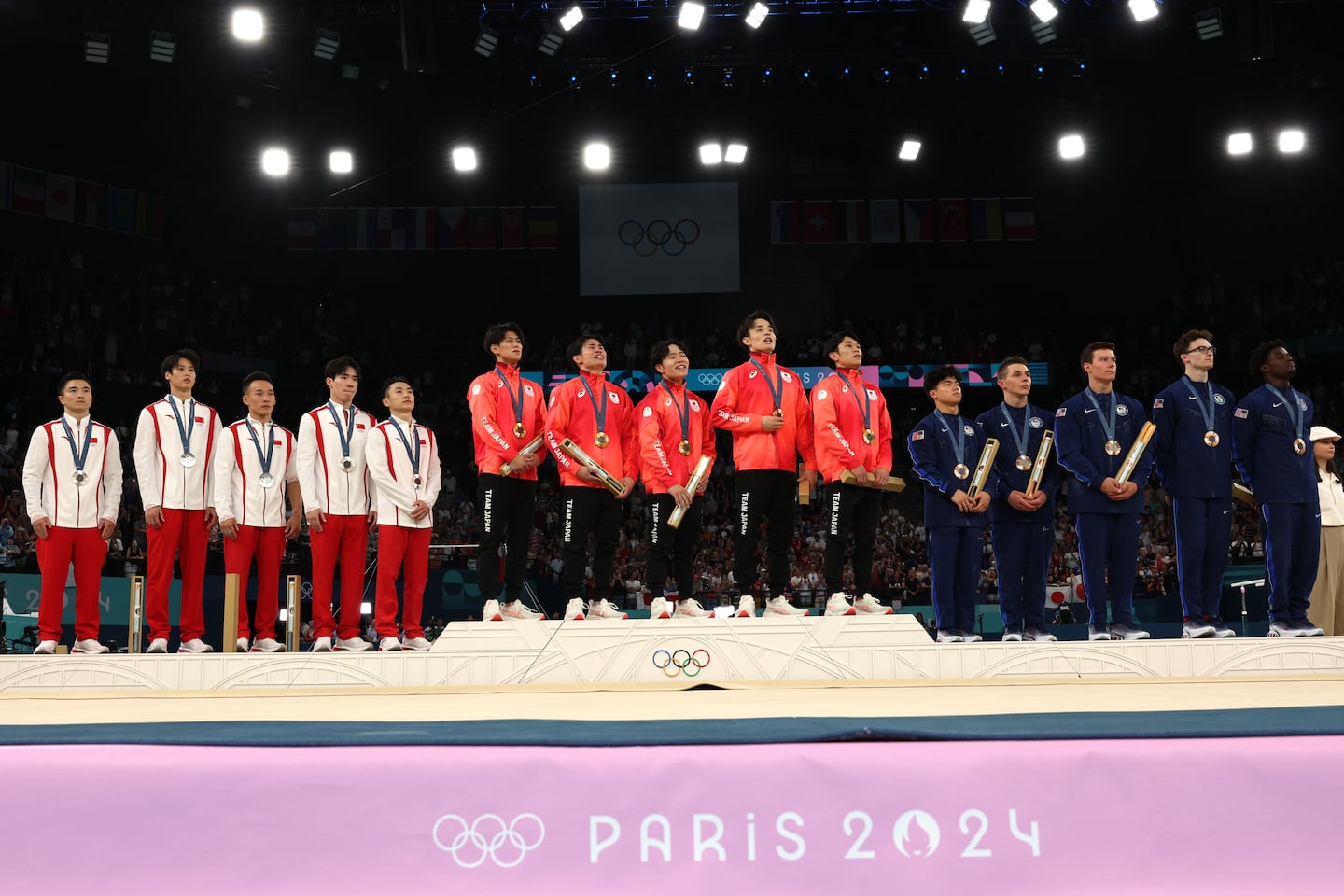 China (silver), Japan (gold), and the US (bronze) on the podium.Jamie Squire/Getty
China (silver), Japan (gold), and the US (bronze) on the podium.Jamie Squire/Getty
Watch Stephen Nedoroscik’s routine — 2:40 p.m.
Nedoroscik delievered the Americans’ highest score of the day, a 14.866.
By Adam Himmelsbach
Meet Frederick Richard, who wants you to remember his name — 2:30 p.m.
PARIS — As Frederick Richard discusses his place as an elite gymnast, he is asked to name other athletes who inspired his journey. For the first time in this conversation, the 20-year-old Stoughton, Mass., native sounds stumped.
Then his voice begins to rise with confidence.
“I always just imagined myself doing all of these crazy skills,” he says. “I imagined myself going to the Olympics and doing all of this stuff that I’d invented, things that had never been done before. That was the person I was always chasing.”
Richard could become one of the faces of the Paris Olympics for the US as men’s gymnastics moves into the spotlight with its bronze in the team final. He is young and energetic and personable, with more than 680,000 TikTok followers and a burning desire to show the world what it has been missing.
What to know about Stephen Nedoroscik — 2:20 p.m.
In his first Olympics, Stephen Nedoroscik was the closer.
The gymnast from Worcester helped Team USA men’s gymnastics win its first team medal since 2008 with a stellar routine on pommel horse — his only of the competition.
Here’s more about him from the Globe’s Cam Kerry.
Team USA wins bronze — 2:10 p.m.
The US wins bronze. Full team standings after Rotation 6:
Japan, 259.594China, 259.062USA, 257.793Great Britain, 255.527Ukraine, 254.761Italy, 248.260Switzerland, 247.427Canada, 245.426
Stephen Nedoroscik! — 2:03 p.m.
Two and half hours after the competition began, Stephen Nedoroscik finally participates in his first and only event. His pommel horse showing gets a score of 14.866, brings his teammates on their feet, and draws a huge applause from the crowd. After Nedoroscik dismounted from the pommel horse, his teammates immediately embraced him as he raised his both arms in the air.
Nedoroscik’s pommel horse score is the highest individual score by an American gymnast today.
Brody Malone stays on and delivers — 2:00 p.m.
Brady Malone, who came off the pommel horse during the qualification round, stays on and scores a 13.700, with a 5.700 in difficulty and 8,000 in execution. The U.S. remains in third in team standings, with their pommel horse specialist Stephen Nedoroscik up next.
Juda executes on pommel horse — 1:52 p.m.
Paul Juda turns in a 13.900 on the pommel horse, with a 5.300 in difficulty and 8.600 in execution.
US moves to third with final rotation ahead — 1:42 p.m.
Headed into the final rotation, Team USA sits in third place with a 1.798-point cushion over Ukraine for the bronze medal. After a slow start, Japan has vaulted into second place, where they were expected to finish.
Full team standings after Rotation 5:
China, 219.296Japan, 216.029USA, 215.327Ukraine, 213.529Great Britain, 211.361Italy, 207.728Switzerland, 207.194Canada, 205.561
Richard wraps up his day with strong floor routine — 1:39 p.m.
In his final event of the evening, Richard registers a 14.466 on floor routine to keep Team USA in medal contention headed into the last rotation. Things would have to go awry for the US on the pommel horse, albeit their worst event, for them to finish in fourth or lower.
Hong steps out slightly — 1:33 p.m.
Not as passionate of a reaction from Asher Hong after his floor exercise, as he stepped out of bounds early in his routine. He earns a score of 14.133, 6.200 in difficulty and 8.033 in execution, with a penalty of -0.1.
Paul Juda starts US off on floor — 1:24 p.m.
Paul Juda gets things started with a 14.200 on the floor exercise, with a 5.800 in difficulty and 8.400 in execution.
US in third after fourth rotation — 1:17 p.m.
After four rotations, Ukraine has leap-frogged Team USA after a parallel bars showing that featured two scores of 15 or more. The U.S. is now in third, behind Ukraine by 0.502 points and ahead of Japan by 0.864 points.
Full team standings after Rotation 4:
China, 173.463Ukraine, 173.030USA, 172.528Japan, 171.664Great Britain, 171.328Canada, 167.596Switzerland, 166.395Italy, 165.829
Brody Malone gets past horizontal bar after Saturday stumble — 1:14 p.m.
Brody Malone, who lost his grip and fell off the horizontal bar twice during the qualification round, returns with a 14.16 to the tune of “U-S-A” chants. Malone earned a 5.800 in difficulty, down from his 6.200 in the qualification round, and 8.366 in execution.
Headed into the penultimate rotation, Team USA huddled together for a brief powwow. They certainly seem aware of their respective positioning.
Richard crushes his routine to big cheers — 1:08 p.m.
Perhaps the loudest cheers of the evening come after Fred Richard completes his horizontal bar routine, which earns a score of 14.822 (6.400 in difficulty and 8.433 in execution). Paul Juda and Asher Hong were out of their seats for almost the entirety of Richard’s routine, passionately cheering on their teammate.
Rotation 4, horizontal bar, underway — 1:02 p.m.
Paul Juda kicks off Rotation 4 with a 13.366 on the horizontal bar, with a 5.100 in difficulty and 8.266 in execution.
US is in second halfway through team final — 12:50 p.m.
A dominant rings performance, including one score of 15.500, pushes China into first place. With three rotations to go, Team USA sits in second, behind China by 1.201 and ahead of Great Britain by 1.734.
Full team standings after Rotation 3:
China, 131.364USA, 130.163Great Britain, 128.429Ukraine, 128.231Japan, 128.231Canada, 126.397Italy, 126.197Switzerland, 124.529
Asher Hong hits his bars routine — 12:47 p.m.
Asher Hong can’t stop fist pumping, this time after his parallel bars routine that earns a score of 14.400 (6.000 in difficulty and 8.400 in execution). Nobody else was competing while Hong was on the parallel bars, so you could hear his coaches and the crowd cheering him on.
Richard completes bars nearly flawlessly — 12:42 p.m.
Frederick Richard turns in a strong 14.566 on the parallel bars, helping keep Team USA in the mix.
Richard earned a 6.200 in difficulty and 8.366 in execution.
Check out the routine:
A stumble by Britain — 12:35 p.m.
Great Britain’s Luke Whitehouse gets a -0.3 penalty on the vault because he stepped out and didn’t stick his landing, which is a promising sign for Team USA’s medal chances. Great Britain was considered a strong threat for bronze.
Brody Malone continues his bounce-back day with a 14.433 on the parallel bars (5.900 in difficulty and 8.533 in execution).
US men move in to first place after second rotation — 12:27 p.m.
Team USA jumps into first place after Rotation 2, thanks to their strong performance in vault. The crowd breaks out into another “U-S-A” chant once their team score, 86.764, is announced. The U.S. has a 1.433-point cushion to remain in medal contention.
Full team standings after Rotation 2:
USA, 86.764China, 86.098Japan, 85.598Canada, 85.331Great Britain, 85.164Switzerland, 84.631Italy, 84.098Ukraine, 83.765
Asher Hong celebrates, and for good reason — 12:18 p.m.
Asher Hong fist pumps at least five times after his vault — and rightfully so. He caps off a strong showing for Team USA with a 14.833 (6.000 in difficulty and 8.833 in execution), one-upping Juda for the top score of the evening.
US is crushing on vault — 12:14 p.m.
Brody Malone, who took a -0.3 penalty for taking a step in his landing during the qualification round, sticks his landing this time around. He earns a 14.533, with a 5.200 in difficulty and 9.333 in execution. Team USA now owns the highest two vault scores at this point in the evening.
Juda sticks it on vault — 12:10 p.m.
Paul Juda sticks his landing off the vault, and can’t help but celebrate making his way back to his teammates. He earns a 14.666 (5.200 in difficulty and 9.466 in execution) — the best score on the vault so far this evening. When the jumbotron showed Juda moments later, he was still smiling.
US men in fifth after first rotation — 12:01 p.m.
Team USA is in decent shape after Rotation 1, with three scores all greater than 14. They sit fifth in the team standings, 0.434 points out of the bronze medal. Their weakest apparatus, pommel horse, is still to come, but so is their best, parallel bars.
Full team standings after Rotation 1:
Great Britain, 43.332Japan, 43.266Canada, 43.166Ukraine, 42.866USA, 42.732China, 42.532Switzerland, 41.632Italy, 40.832
Rotation 2, vault: Paul Juda, Brody Malone, Asher Hong
Hong delivers in first rotation — 11:53 a.m.
Big double-fist pump from Asher Hong after he finishes his rings routine, which earns a score of 14.533 — 6.000 in difficulty and 8.533 in execution. Big cheers, too, when his score is announced. Hong’s score is the best on rings from the Americans in Rotation 1.
Brody Malone redeems himself — 11:47 a.m.
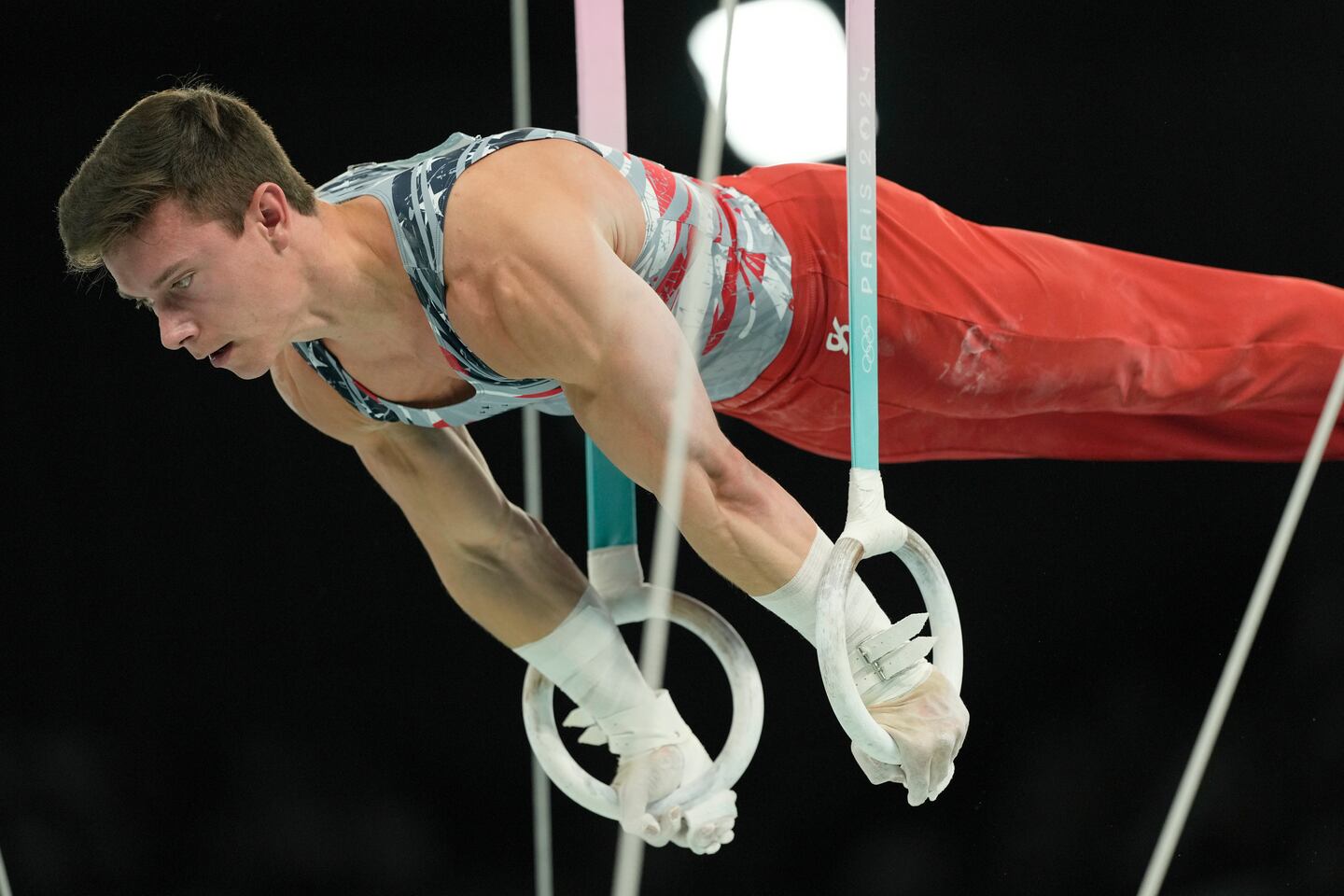 Brody Malone in his still rings routine.Charlie Riedel/Associated Press
Brody Malone in his still rings routine.Charlie Riedel/Associated Press
Brody Malone, who had a tough day in the qualification round, keeps the US competitive with a score of 14.033, 5.900 in difficulty and 8.266 in execution. The American and Italian athletes are high-fiving each other in between turns, which is a nice display of sportsmanship.
Richard completes rings — 11:39 a.m.
Big cheers for Frederick Richard at the conclusion of his rings routine. The crowd even broke out into a “U-S-A” chant. He scored a 14.022, with a 5.600 in difficulty and 8.433 in execution.
Big cheers for Team USA as they take the floor — 11:30 a.m.
The support for Team USA continued during the athlete introductions, as the five American athletes received the loudest and longest applause. Ukraine also received a noticeable ovation, likely a reflection of the anti-Russia sentiments within the sport.
By Will Graves, Associated Press
About the rest of the field — 11:15 a.m.
The sport’s two superpowers, China and Japan, surged to the top of qualifying at Bercy Arena on Saturday. China seeks its fourth Olympic team title, Japan its eighth.
The five-man Chinese team, missing veteran Sun Wei after he was injured during training Thursday, used a series of spectacular routines on rings and parallel bars to stamp itself as the favorite heading into Monday’s final.
Japan, the reigning world champion, dealt with a couple of uncharacteristic mistakes by current world and Olympic gold medalist Daiki Hashimoto but still finished well clear of third-place Britain.
While the 22-year-old Hashimoto will get a chance to defend his title in the all-around, he won’t on high bar — his signature event — after stumbling during his dismount. Hashimoto appeared to be dealing with right shoulder discomfort for much of the afternoon and was tended to by a Team Japan trainer shortly after finishing up on still rings though he said afterward he was not hurt.
The Japanese settled for silver at home in Tokyo in 2021, losing to the Russians by just over a tenth of a point in a close final while China took bronze a little further back.
“It was frustrating,” Japan’s Kazuma Kaya said. “But we kept practicing every day for success today. Next time, in (the team final), I want the gold medal.”
The gold isn’t the only medal in question. Bronze is a toss-up, too, though Britain made a strong case by topping the first subdivision, a group that included the U.S. Ukraine overcame a nightmarish set on high bar to slip past the U.S. and into fourth at 253.893, dropping the Americans into fifth at 253.229.
Italy, Switzerland and Canada also advanced to the finals, with the Canadians claiming the eighth and final spot by less than a quarter of a point over Turkey.
The British insist they don’t have any sort of rivalry with the U.S., even if the two programs have spent the better part of a decade jockeying for position at nearly every major international event.
Britain sent a very real if unspoken message: it is more than capable of grabbing a bronze to go with the one it somewhat unexpectedly won in London a dozen years ago.
Jake Jarman’s 84.897 all-around total was just ahead of teammate Joe Fraser while Max Whitlock — in his fourth and final Games — fought off the jitters he knew would come to score a 15.133 on pommel horse and give Britain plenty of momentum.
“A lot of people have asked me that question in terms of ‘How’s it feel to be above the U.S.?’” Whitlock said. “To be honest, you take it with a pinch of salt. I think it’s really important to kind of just think about our job.”
Russia’s absence creates a medal opportunity for the U.S., Britain and Ukraine behind another duel between China and Japan for gold. Still, Whitlock downplayed the idea that if Russia was involved, a team medal for anyone outside the sport’s Big Three would be out of the question.
“If they were in, you’d like to think that they’d be up near the top,” Whitlock said. “So with them not, of course, there’s a little bit of (a better opportunity to medal), but only a little bit.”
Où est Pierre? — 11:00 a.m.
As someone who has an appreciation for in-stadium entertainment, Bercy Arena just introduced, “Where is Pierre?” A man dressed in a hat and mustache goes to hide in the stands and then, after enough time has passed, the announcer comes back to ask, “Where is Pierre?” And fans close to him are supposed to respond, “There is Pierre!”
Hello from Bercy Arena — 10:45 a.m.
The fans are starting to trickle in at Bercy Arena, with an hour or so to go until the start of the men’s team final. When an announcer read out the competing countries and asked fans to cheer for their respective nations, the United States and Great Britain garnered the loudest responses.
Column by Tara Sullivan
In his Olympic debut, Frederick Richard carried himself with confidence — 10:30 a.m.
PARIS — Frederick Richard was steps away from the pommel horse inside Bercy Arena Saturday, mini puffs of white chalk floating away as he contorted his body through a final mental run-through of his first Olympic routine. Waist twisting side to side, arms moving in unison, Richard’s eyes focused sharply on the apparatus in front of him, awaiting the green light that would signal his mount.
But suddenly, his mind was traveling backward, as it often does when he competes at this sport he loves so much.
“When I’m entering the horse, I’m always thinking like, this is what my younger self has ever, always wanted,” he said later. “It’s what I give everything every day in the gym for.”
By Will Graves, Associated Press
Brody Malone is looking for redemption — 10:00 a.m.
PARIS — Brody Malone has spent the last 16 months defying the odds, improbably coming back from a catastrophic right knee injury in the spring of 2023 to reach the Olympics for a second time.
When the 24-year-old won his third national title in June, he looked every bit the star the Americans envisioned when he became the standard-bearer for the men’s program three years ago.
Yet Malone has been around long enough to know that gymnastics is not a sport where progress is linear. If he needed a reminder, it came during team qualifying Saturday, when the sport that has given Malone so much took away an opportunity to compete in the all-around final.
Malone fell twice on high bar — where he was the 2022 world champion — and once on pommel horse. Throw in an ill-timed slip on floor exercise, and all the momentum and good vibes Malone had generated during his remarkable return vanished.
Afterward, Malone offered no excuses. He apologized to his four teammates and shook his head at how a day that began with so much promise slipped away.
“I feel like I’m in good shape,” Malone said. “But I’ve just got to put the routines together.”
Malone is hardly the only one. The U.S. came to Paris believing it could return to the medal stand at the Games for the first time since 2008. Missteps both little and big kept cropping up. Save for Paul Juda’s steady performance while serving as the leadoff on five of the six events, there was little consistency to go around.
A chance at redemption awaits in the team final Monday night, where Malone and the Americans are hoping to move past a sloppy fifth-place finish.
While the top of the podium figures to be a duel between superpowers China and Japan, the race for bronze is wide open. It’s a race Malone can help the U.S. win if he can recover the form he showed at U.S. Championships, when he sent a message to rising star Frederick Richard and everyone else that when he is right, he’s as good any American out there.
Malone is by far the most experienced athlete on the five-man U.S. team. He has taken on the role of de facto captain, and while he wasn’t at his best during qualifying, he made sure to tell his teammates to drink in the moment, as difficult as it might have been at times.
“I was like ‘Congratulations, you guys are officially Olympians,’” Malone said.
The way forward, however, may be for the Americans to suffer a bout of temporary amnesia during the finals.
“Treat it like the first day of NCAA championships,” said Malone, who won a pair of NCAA all-around titles at Stanford. “The first day is always the day to get the kinks out, get the nerves out.”
The nerves will need to be out if the U.S. wants to navigate the final, where teams enter three gymnasts in each event, with every score counting. One wrong step, one anxious routine can scuttle medal hopes in a flash.
Malone will compete in four of the six rotations in the team final, four opportunities to move on from a difficult day. Then again, he’s endured worse.
“You can’t always be perfect,” he said. “I just kind of made some silly mistakes that I know I can’t make. But I’ll make sure that I go to the gym and (figure things out).”
By Will Graves, the Associated Press
Paul Juda has spent most of his career in the background. Not in Paris. — 9:45 a.m.
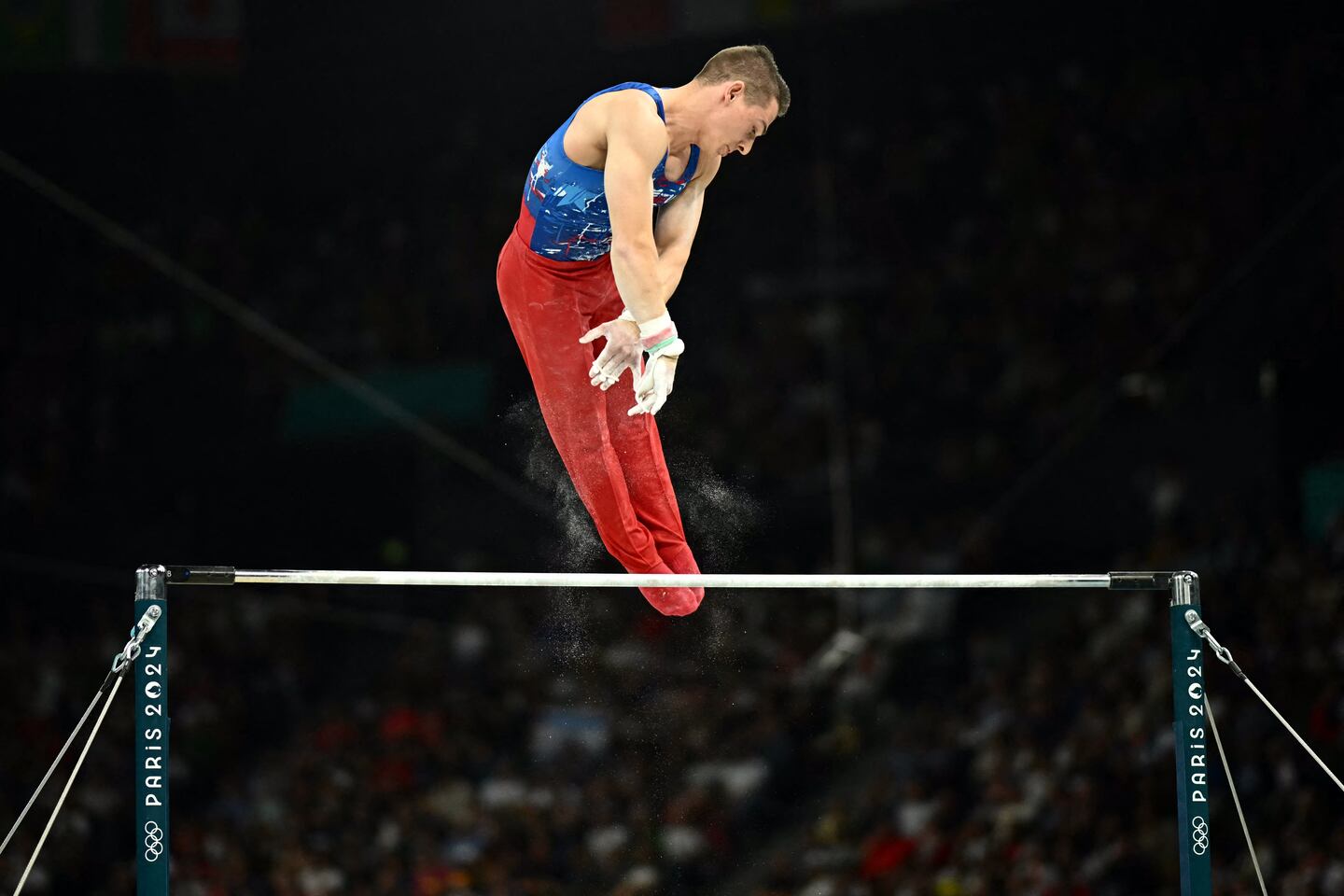 Paul Juda earned an all-around berth in Wednesday’s competition, but first up is the team final.LOIC VENANCE/AFP via Getty Images
Paul Juda earned an all-around berth in Wednesday’s competition, but first up is the team final.LOIC VENANCE/AFP via Getty Images
Paul Juda long has let himself dream. Just never too big. It’s safer that way.
Besides, wasn’t he dreaming big enough when the American gymnast wrote down “compete in the all-around at the Olympics” on the whiteboard in his apartment near the University of Michigan campus?
Turns out, apparently not.
When the 23-year-old returns to Michigan next month, he’ll have to pull out that whiteboard and grab an eraser after the athlete who has spent most of his career ceding the spotlight to others grabbed a piece of it during qualifying at Bercy Arena on Saturday.
Tasked with serving as the leadoff on five of the six events for the five-man American team — a spot reserved for gymnasts known more for their consistency and reliability than anything — Juda put together an all-around total of 82.865 that was good enough to earn a berth in the all-around finals next week.
“I think today could have been one of those things where I got to say, ‘I did all-around at the Olympics’ (and that’s it),” Juda said. “But then to hopefully be making an all-around final, I think that’s the cooler thing.”
A thing Juda wondered whether he has been worthy of during a career that’s seen him help the U.S. win a team bronze at the 2023 world championships and claim the 2022 NCAA all-around title while navigating what he’s called “the darkest pits,” times when his self-confidence disappears, replaced by doubt that can be difficult to shake.
There was a time earlier this year when reaching Paris seemed like a long shot. The native of the northern Chicago suburbs went through a stretch where his gymnastics were “horrible” and he pondered shifting his focus away from making the Olympic team.
A pep talk from girlfriend Reyna Guggino helped him turn things around. She told him it was OK to make the Olympics a priority. To attack the opportunity rather than shrink from it.
And there was Guggino, also a gymnast at Michigan, yelling from the stands on Saturday as Juda put together six routines that weren’t the best gymnastics of his life but were good enough to earn the second American spot in the all-around after three-time national champion Brody Malone faltered.
Juda called Malone the “captain of the ship” even on a day when he fell twice on high bar and once on pommel horse.
“Of course I’m upset with myself,” Malone said. “But at the same time, I’m extremely happy for Fred and Paul. I know they’re going to crush it.”
Even if the definition of “crushing it” differs for the two Michigan teammates. Richard, 20, is the reigning bronze medalist on the all-around who mixes big skills with a big personality.
Juda is more measured. High performance director Brett McClure put Juda in the leadoff spot because his gymnastics are a little safer, with the idea being that if Juda avoids mistakes it will provide a solid foundation that allows those who come after a little more freedom to go for it.
“He wanted to go up with a hit routine and kind of set the momentum for everybody else,” McClure said. “So he did his job.”
By Tara Sullivan
Stephen Nedoroscik does one thing very well. And he crushed it on Saturday. — 9:30 a.m.
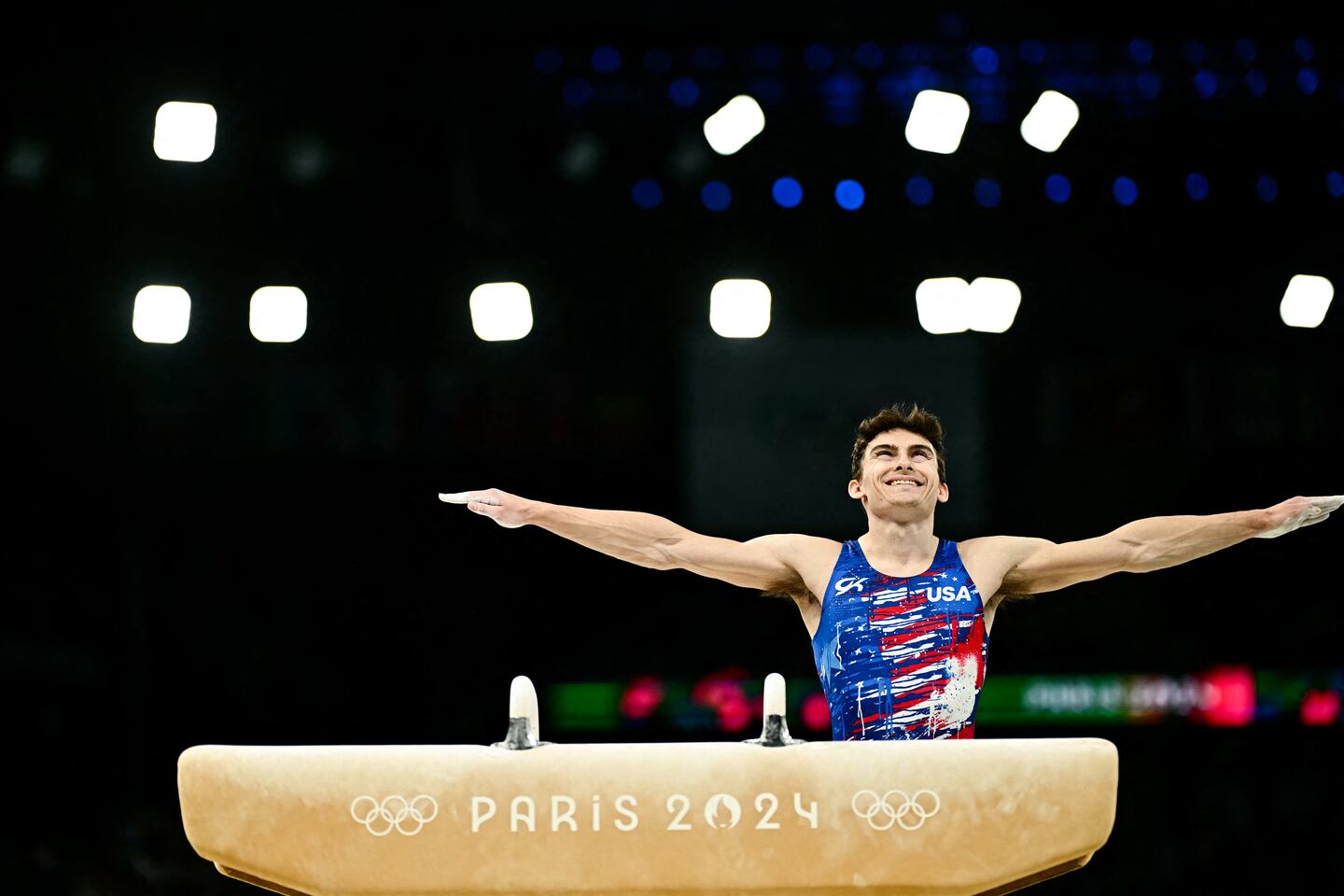 Stephen Nedoroscik recorded the highest score of anyone on pommel horse during Saturday’s qualifying.GABRIEL BOUYS/AFP via Getty Images
Stephen Nedoroscik recorded the highest score of anyone on pommel horse during Saturday’s qualifying.GABRIEL BOUYS/AFP via Getty Images
PARIS — Stephen Nedoroscik knows his role.
Mount the pommel horse. Compete at his highest level. Score well. Help Team USA.
At Saturday’s men’s gymnastics team qualification inside Bercy Arena, the Worcester native did his job very, very well.
“He killed it,” said teammate Frederick Richard, the other half of Team USA’s Massachusetts contingent as well as the squad’s top all-around threat. “I mean, that’s his event. He knows he has a very important role to play on that event but he handles it like a king.”
On Saturday, that meant anchoring the American’s first rotation on pommel horse, where Nedoroscik’s daring routine carries the highest difficulty score of all five gymnasts, filled as it is with one-handed spins, amazingly consistent movements, and impressive body control. But even if Nedoroscik has become well-accustomed to doing his one event and being finished, watching as his four other teammates compete at rings, vault, parallel bars, high bar and floor, helping them with their bags, making sure they have water, cheering them on, this day was different.
That’s because Brody Malone, the team’s most veteran gymnast and the only one back from Tokyo in 2021, came off the pommel horse when he went up first, a mistake that resulted in a disappointing 12.1. That meant Nedoroscik’s score had to count toward the Americans’ team total. In other words, the pressure was on.
“It definitely did get in my head a little bit,” he said. “You know, but at the same time the goal was the same. I wanted to hit a good routine. So whether or not someone fell before me didn’t necessarily impact me. Obviously, as I was waiting there, I did see Brody’s score come up. I didn’t know that he made a mistake but mistakes happen. I’m not going to get mad at him or anything like that and [it] didn’t really put any pressure on me.”
Overall, as an Olympic newbie, having just missed out on being a specialist on the Tokyo team, Nedoroscik was delighted with how his first attempt went. His 15.2 was the highest single score for any American routine.
“As soon as I got down, and I was giving all the guys high fives, Paul [Juda] literally pointed to my arm and said, ‘You have goosebumps, man.’ The moment was surreal. I’m so proud of what I did in that moment, I was like, Okay, I think I made the horse final and I think that now as well. I’m very happy.’”
By Adam Himmelsbach
‘That’s the person I was always chasing:’ Meet Frederick Richard — 9:15 a.m.
PARIS — As Frederick Richard discusses his place as an elite gymnast, he is asked to name other athletes who inspired his journey. For the first time in this conversation, the 20-year-old Stoughton, Mass., native sounds stumped.
Then his voice begins to rise with confidence.
“I always just imagined myself doing all of these crazy skills,” he says. “I imagined myself going to the Olympics and doing all of this stuff that I’d invented, things that had never been done before. That was the person I was always chasing.”
Richard could become one of the faces of the Paris Olympics for the US as men’s gymnastics qualifying begins Saturday. He is young and energetic and personable, with more than 680,000 TikTok followers and a burning desire to show the world what it has been missing.
By Alexa Podalsky
US men’s gymnastics team roster — 9:00 a.m.
Here’s a rundown of the roster.
Asher Hong
Age: 20 | Hometown: Tomball, Texas
Asher Hong’s gold (all-around) and silver (still rings) medals at the 2023 US Championships increase the chance the US will win its first Olympic team medal since 2008. Competing at Stanford, he won six gold medals in the last 2 years, and was an all-around bronze medalist in the NCAA championships in 2023. He finished first in the still rings at the team trials in June, and fourth in floor and parallel bars.
Paul Juda
Age: 23 | Hometown: Deerfield, Ill.
Paul Juda was 19 when he became the youngest national team member after he competed in the 2020 Winter Cup. He won eight medals in three NCAA championships at Michigan. Juda was forced to miss the 2023 season due to an injury but still received the Nissen-Emery Award, given to the best senior collegiate male gymnast. Juda helped Michigan win its first floor title since 1992 at the 2024 NCAA men’s gymnastics championship with his first-place finish. He competes in Ann Arbor alongside Stoughton’s Frederick Richard.
Brody Malone
Age: 24 | Hometown: Summerville, Ga.
Brody Malone wasn’t expected to participate in this Olympics after suffering a knee injury at the 2023 DTB Cup. A year later, he managed to defy the odds to earn his second Olympic team berth. Malone finished fourth in horizontal bar in Tokyo in 2021 and advanced to the all-around final. He was a seven-time NCAA champion at Stanford and placed first in horizontal bar at the 2022 world championships. Malone and Asher Hong were teammates during their time at Stanford. He won the Nissen-Emery Award the year before Juda.
Stephen Nedoroscik
Age: 25 | Hometown: Worcester
Nedoroscik grew up in Worcester and attended Worcester Technical High School before matriculating to Penn State in 2017. He is a specialist, competing only in pommel horse. Nedoroscik’s focus makes him a not-so-secret weapon for the Americans. He won a gold medal at the 2021 world championships, and he is tied for the most titles in US history with four. He took home gold in the 2024 World Cup.
Frederick Richard
Age: 20 | Hometown: Stoughton
Richard trains at the Massachusetts Elite Gymnastics Academy in Millis and competes for Michigan, where he was named Big Ten gymnast of the year in April. He became a junior national team member in 2019, which helped boost his social media presence — he has more than 670,000 followers and 30.5 million likes on TikTok and another 310,000 followers on Instagram. Richard won a bronze medal in the team and all-around at the 2023 world championships when he was 19, making him the youngest individual medalist in men’s US history. He won the NCAA team, all-around, and still rings silver medals with Michigan in 2024. At the US championships this year, he placed first in floor, second in all-around and horizontal bars, and sixth in still rings.
Information from wire services was used in this report.
Nicole Yang can be reached at [email protected] her @nicolecyang.
Source link : https://www.bostonglobe.com/2024/07/29/sports/olympics-mens-gymnastics-live/
Author :
Publish date : 2024-07-29 15:29:48
Copyright for syndicated content belongs to the linked Source.

